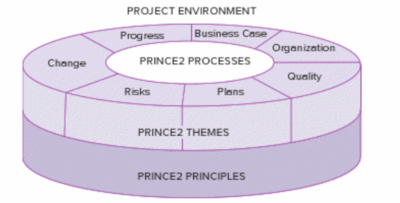PRINCE2, A Project Management Methodology
Project management is a discipline that is indispensable and rapidly expanding as an organization nationally and globally. To implement new strategies and products successfully, an organization needs to select project managers to introduce new products, services with a purpose of gaining competitiveness in the market. However by selecting a project manager and a team, an organization is not guaranteed successful project outcomes.
In past years different methodologies have been developed to help organizations consider all the necessary components of project management, e.g. planning, controlling, communication and finalization of projects. One of the widely used project management methodologies is the PRINCE2 method, this methodology is based on seven principles and seven themes which will be described throughout this article. While this article is going to be used publicly, it is important to know other properties of this methodology, e.g. scalability and advantages, in order to make the right discussion while choosing a project management methodology.
Contents |
PRINCE2
PRINCE (PRoject IN Controlled Environments) is a structured method for effective and efficient project management. The method was developed from an exiting method PROMPTII, which was developed by Simpact Systems Ltd in 1975. In 1979 PROMPTII was adopted by CCTA (The Central Computer and Telecommunications Agency) in UK as the standard for all government projects, mainly for IS (Information Systems) projects. In 1989 Superseded PRINCE the exiting method PROMPTII within government projects. [book]
CCTA continued developing the method and in 1996 launched PRINCE2 in response to user requirements for improved guidance on project management on all projects, not only IS projects. PRINCE2 is based on experiences of European project managements and project teams, who have contributed, some from their successes and others from their mistakes and omissions. [1]
Overview of the method
The PRINCE2 structure model, shown in Figure 1, consist of eight management processes, covering activities from starting up of a project, through controlling planning and closing of the project.
These activities are the same for all project also in case of implementation of improvement within the organization.
Overview of processes
Starting up a project (SU)
Directing a project (DP)
Initiating a project (IP)
Managing stage boundaries (SB)
Controlling a stage (CS)
Managing product delivery (MP)
Closing a project (CP)
Planning (PL)
Overview of themes
Overview of principles
The Benefits of PRINCE2
A good project management method will guide the project through a controlled, well-managed and visible sets of activities to archive organization goals. Organizations are aware of the benefits a project management method can bring, and some of the benefits are:
- A repeatable method
- A structured method
- Building on experience
- Ensuring that everyone knows what to expect, where, how and when
- Early warning of problems
Sometimes projects are related to each other or they are a part of a larger program an organization is managing, in all these situations the PRINCE2 method is applicable, it can provide the organization with:
- Active involvement of users and stakeholders in the project
- Controlled management of resources
- Controlled management of risks
- focused on goal of the project, what the project is delivering, why and by whom
PRINCE2 provide the project with:
- Organized start, middle and end of a project
- Regular reviews of the progress
- Good communication between project management team and organization
Project managers are able to:
- Keep meetings in the vital points of the project
- Provide brief reporting about the project
- Divide projects into manageable stages in order to make the goals achievable
